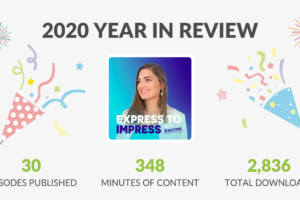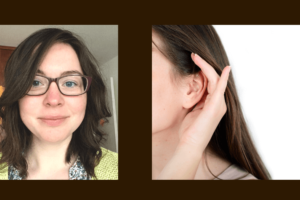Introduction to Improving Your Listening Skills
Hello! It’s Kristine here with the Express to Impress podcast. Before we get started, I would like to wish you all a very Happy New Year! I hope you reach many of your goals and have good health this year.
Can’t read now? Pin for later!
I’ve missed producing episodes for the podcast and want to share a bit of an explanation with you. Last summer, right before my child entered daycare, his pediatrician warned me that he would have 10-12 illnesses lasting a week or more in the first year at daycare. 10-12 illnesses! I know! It seemed implausible, but alas, it is happening, and I’m missing so much work! In fact, we’re recovering from COVID now.
But the show is back. I want to thank you for your patience and for tuning in again, and I look forward to many more podcasts and, hopefully, a healthier 2023!
Alright! This week, I am excited to share a conversation I had in December with Cara Leopold, an English teacher and founder of Leo Listening, who is known as the listening expert. I really enjoyed chatting with her and learned so much during our call. We covered a lot of topics, so this will be the first of two episodes of our conversation. The main theme of our conversation was building great listening skills in another language. In this first episode, we talk about how to improve your listening skills through watching movies in your target language, learning to listen for linking and reductions, and what to do when you don’t understand your colleagues in meetings.
Alright, let’s get started!
The Importance of Listening Skills in Language Learning
Kristine
Welcome, Cara, to the Express to Impress podcast. I’m very happy to have you today.
Cara
Thank you so much for having me on.
Kristine
Absolutely. So I have been learning about you and your work, and I have heard you referred to as the listening expert. So, I would love to hear you introduce yourself to the listeners.
Cara
I’m Cara and I run a website called Leo Listening, and it’s helping professionals chat to their fast-talking English-speaking colleagues over coffee, thanks to films. So I help people improve their English listening skills through movies because movies can be hard to understand, and we’d all love to understand both movies and real people without the subtitles. That’s kind of the idea behind that. So those are the things I talk about. What else is relevant? Maybe? I live in France. So it’s important to me, as someone living in France long term, to really understand what people are saying to me. Obviously, not just on a superficial level, but on a very, very highly detailed, as in, I understand 99% of what they’re saying.
Kristine
Okay, wonderful. Well, thank you for your introduction. You’re doing very important and interesting work, and I’m excited to see where our conversation goes. So I work with a lot of English language learners. A lot of them are working in English but always working to improve their English skills. And a lot of people come to me wanting to work on their speaking skills. And you really focus on listening skills. So can you share with the listeners why English listening skills are so important?
Cara
Yeah, sure. It’s a little bit connected to what I mentioned in my introduction. So listening skills are the foundation for learning your native language, no matter what it is. So that’s the skill that we start off developing. We have a silent period before we start talking. Apparently, we even start doing a bit of listening when we’re in the womb. There’s evidence to suggest that we’re already tuning into the language that surrounds us from the womb. We really start listening very young. Yeah, it’s kind of crazy. And in fact, apparently, in communication, we spend 45% of our time listening. So that’s higher than any other skill. People might think, well, I spend most of my time speaking, but listening is actually the skill that dominates.
So by that logic, the foundation for also learning future languages should be listening. I mean, we should really start off surrounding ourselves with input in the language that we want to learn, including spoken input. And that will help us to get attuned to the sounds of a new language to pronounce it better. And like I said in the beginning here in France, what’s helped me is being able to understand what others are saying, noticing what they’re saying. That’s a big part of language learning. And then reproducing it. So noticing the expressions that people keep using, and then when you use them, you sound more authentic in the language because you’re using what the people around you actually say, as opposed to what you read in a book or what you got out of a list of 100 idioms or whatever it is.
Kristine
Yes, absolutely. You said that so eloquently, and I try to express that to many of my clients, too. I can teach you words and phrases and idioms, but the most important language for you to learn is the language being used in your environment. What are your colleagues saying? Write down those phrases, listen carefully, and use those, even if it sounds strange to you. That’s the language that people will recognize and will feel connected with you. But yeah, I love how you said that.
Cara
Thank you. But, yeah, people appreciate you using the language that they use. That kind of mirroring of them. That’s also good communication, is also about, I said copying, but really, you’re just taking what’s familiar. And when people hear that, they’ll appreciate it.
Kristine
Absolutely. And to me, it feels like it takes some of the pressure off of language learning as I had envisioned it many years ago, where I needed to learn the grammar and the structure and be able to translate in my mind. And I really struggled in the classroom because I thought that was how I had to learn the language.
But for me, when I studied abroad in Mexico, I just started repeating what my host mom was saying, and one day she laughed and said, you would learn so much more just staying here with me than going to school because you learned really quick in the home and just repeating what you’re hearing. So, for me, it was especially helpful to learn through listening and repeating and not getting so caught up on the structure of what I was saying. But I knew what I was saying in general, not necessarily the specifics of constructing that sentence. But that was exciting, and I felt like I was making progress.
Cara
Oh, yeah, you knew the meaning. That’s the important thing because you were getting that directly in context, so you don’t need to translate it. But, yeah, there’s a sort of thing where we kind of learn to believe that it needs to be really effortful, like word-by-word translation, very hard and cognitively demanding. And that’s not actually how language learning works. But I suppose we sort of school teaches us to believe that. And to do that, even though it’s not natural.
Improving Your Listening Skills for Meetings
Kristine
Yeah, absolutely. Interesting. So I wanted to talk about some common issues that I’ve observed and get your info on some of these. So sometimes my clients will come to me. They’ve worked really hard to land a job in their target language. They succeed, they feel on top of the world, and then they don’t understand a lot of what’s being said in meetings. So how would you recommend the person improve their listening skills quickly? Like, they feel like they’re an imposter. They’re in these meetings, and they’re like, am I going to lose my job? What would you recommend?
Cara
Yeah, that’s a pretty stressful situation. I mean, I would say improving your listening skills is like any sort of language learning. It’s more of a long-term endeavor. But for that kind of situation where there’s a real concrete work scenario to deal with, you’re probably better off for a very short-term result, using some other communication strategies or compensatory strategies. So that could look like intervening when you don’t understand someone. So asking them to repeat things, or better, probably asking them to paraphrase things. Saying,
Okay, so let me check that I got this right.
So this is going to sound good in a work context, as in, I’m worried about getting things right because I’m a conscientious person. I’m asking you to reformulate what you said. All these kinds of strategies are probably going to be better in the short term. And also just simply remind your colleagues if the majority of them are from the US. And their first language is English, and perhaps they don’t speak a second one, and they’re perhaps not very aware that you might be struggling, just gently reminding them that it is harder for you to follow. Even if your English is very good, it’s still a bit tricky. So just reminding them to slow down or to clarify points. And yeah, just using those kinds of strategies is going to be better in the short term.
There are more specific things you can do to work on your English listening skills, but I would say for that very sort of urgent thing that needs an urgent fix. So, in that case, it’s more about sort of negotiating with your colleagues and putting part of the onus, part of the responsibility, on them. It’s not all your problem to resolve; clear communication in the workplace is obviously a shared responsibility. And people get it wrong. People get it wrong in their native languages as well. They’re not clear. They don’t communicate the right way at the right time, et cetera. So it’s all something we’re all learning all the time, no matter what our first language background is.
Kristine
Absolutely. I’m so glad you mentioned speaking up when you don’t understand someone. I think it’s a vital skill. It’s required when you need to be resilient, and you need to make it in this tough environment. And you need to advocate for yourself. And I know many of my clients struggle with that. They feel shame. They feel like,
I’ve got the job, and they think I have good enough English, but I don’t understand what’s going on here.
But I’ve tried to explain that it is a part of every language learner’s journey. There’s nothing wrong with you. And if you got the job, then they do believe you have the English skills to do the job. And they don’t think you need to have perfect English to do the job. But there’s going to be a lot of on-the-job learning. And you’ll progress faster if you speak up. But that’s hard when you just meet someone, and you tell them you need them to slow down. You need them to accommodate you. That takes courage, and it’s uncomfortable. But in the long run, people will succeed if they do that.
Cara
Yeah, exactly.
Tune in For Part Two With Cara Leopold!
That brings us to the end of the first episode about developing your listening skills in another language! I invite you to tune in for the next episode to hear the rest of my conversation with Cara. We’ll talk about how to get used to different accents and speaking speeds, how to motivate yourself to learn a language for work or school even if you don’t want to, what to do if your language learning has stalled, bad habits language learners pick up when learning their target language in a traditional classroom setting, and more about Cara’s Movie Club.
Before I wrap up, I want to remind you that you can subscribe to receive notifications whenever I release a new episode. You can subscribe anywhere you download podcasts, like Apple, or you can tune in and read the episode transcripts on my website, express-to-impress.com.
Thank you so much for listening to the Express to Impress podcast. If you found this episode useful, please remember to share it with a friend! See you next time. Bye!







Leave a Reply
Your email is safe with me.